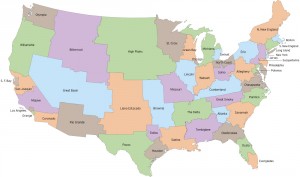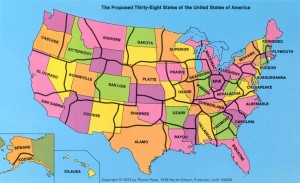A vote for the President of the United States is actually a vote for an “elector” who pledges, but is not legally obligated, to vote for a specific candidate in the Electoral College. Forty-eight states then allocate all of their electoral votes to the popular vote winner in that state. This means that a candidate receiving the most votes nationwide is not necessarily the one that receives the most electoral votes and becomes President. If the popular-vote loser many states by small margins, and loses some of the others by large margins, they can win the electoral vote, despite losing the national popular vote.
This winner-takes-all system of allocating electoral votes also has the side effect of making a few “battleground” states the primary focus of election campaigns. Candidates descend on these states, funneling money and advertising into them, and tailoring their campaigns to win over voters there. Voters, of either party, in the remaining “spectator” states are effectively disenfranchised, and the small percentage of voters in the battleground states elect the president.
This isn’t even how the electoral college was intended to work. The framers intended that the electoral college would usually fail to choose a clear winner, instead nominating the most popular candidates for election by Congress. This hasn’t happened in over two hundred years.
Programmers have a term for something that’s neither operating as originally intended nor guaranteed to do what their users ask it to do. The Constitution is buggy.
Yet the Constitution is notoriously hard to change. A programmer might use the term legacy.
How would a programmer fix this? Find a way to hack a bug fix into the legacy system.
What should the goal of the fix be? We should elect the president in the same way that every governor, mayor, senator, representative, city council member and dog-catcher is; by popular vote. If popular vote is good enough for every single other elected office in this country and in many other democratic countries around the world, it should be good enough for the President of the United States of America.
How do we change the Constitution? Turns out we don’t have to. The founders left the allocation of electoral votes up to the states:
Each State shall appoint, in such Manner as the Legislature thereof may direct, a Number of Electors…
-U.S. Constitution
The appointment, and mode of appointment, of electors belong exclusively to the states
-U.S. Supreme Court
And the fix? The National Popular Vote Plan allocates all of a state’s electoral votes to the national popular vote winner. It only goes into effect once enough states pass it to command a majority of electoral votes. The electoral college won’t go away, but it will become obsolete. In programming terms, this plan ensures a buggy legacy system will never (again) get fed the kind of data that triggers the bug.
The National Popular Vote plan has been making its way through state legislatures for the last few years. I’ve brought it up in conversation a few times recently (because of my Visualizing the National Popular Vote plan project), and I’m surprised how many people don’t know about it. There should be a huge grass-roots movement behind this plan to re-enfranchise the electorate, but even smart, well-informed, thinking people haven’t heard of it. So please, if you agree with me and think the National Popular Vote Plan is a good idea, forward this page or NPV’s website to your friends, bring it up at parties, or support it with a donation. And if you don’t agree with me, forward this page or NPV’s website to your friends, bring it up at parties, or… well I guess I can’t expect you to support it with a donation.
Let’s get rid of this obsolete, broken, idiotic electoral college system once and for all.




